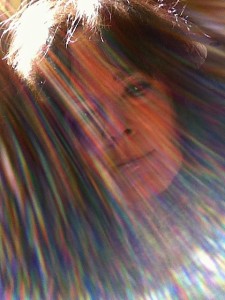Sarah Maclay is the author of Music for the Black Room, The White Bride and Whore (all, U of Tampa), as well as three limited edition chapbooks. In 2013, The Huffington Post shortlisted her as one of five American poets to watch. Her poems and criticism have appeared in APR, Ploughshares, FIELD, The Writer’s Chronicle, Poetry Daily, VerseDaily, The Best American Erotic Poems: 1800 to the Present, Poetry International, where she serves as Book Review Editor, and numerous other journals. Her short stage piece Fugue States Coming Down the Hall was anthologized in Scenarios: Scripts to Perform. The recipient of a Pushcart Special Mention, a 2009 Grisham fellowship, and the Tampa Review Prize for Poetry, she teaches creative writing and literature at Loyola Marymount University and conducts workshops at The Ruskin Art Club and Beyond Baroque. www.sarahmaclay.com
.
Woman Chained to Fire
As if a field of corn is red and orange in the wind, and she raises her hand to answer a question; then her other hand. Her bare arms still suspended above the stalks, the cold metal of the cuffs against her wrists, as the leaves flap about her thighs, tassels exploding in sparks near her ribs, the hard and swollen ears of corn shifting their weight in the thrashing wind, her chains attached so far beneath the tangle of roots that even though they hold to nothing but flame, she cannot move. The field is a distant one, far from any house, and the corn, swaying in its night wind, is growing. Her face is strangely placid. Rusty silk, drying into curls, pushes toward her mouth, and the corn plants, now persimmon, now electrifying blue, flicker into each other like a field of tall and narrow wings, trying to rise altogether into the air, brushing against her back, flags, the nearly wet slap of their touch, the rush, the sting, how does she stand, how does she stand it? What is the question?
.
Oil on Panel
The sky is wooden. And, beyond the brim of fur that lines their hats, the sea is also made of wood. Because, you see, the wood is a kind of water, a portrait of water, stilled. Things are far from hopeless. And in the same breath—those scalloped hills, those waves of land held in their moment, now appearing dry. And what is that snow, that snow they stand on, edging toward the shore? In their long black coats, in this gray and white landscape—landscape, we say, though air and snow and water are not land—the two men show no sign of cold. Yet we call them frozen. They stand as calm and still as that disc—thin as a communion wafer—disc that seems to sink into the ocean, to dissolve; so white and still now that it doesn’t even look like fire. As though we could touch it, look at it. As though it would not, did not burn. What is it the skin of? The tree is the form the water took. The woods were thick with trees. And is it sun or moon? In either case, it neither falls nor rises. Earth has simply turned. And these men, these men are riding on it, thinking it is still, charting the wooden endless horizon, charting the edge of the sea. They might have lived at the rim of the Arctic Circle, might have lived in the 1800s, called themselves explorers, fur traders, surveyors charting the territory of wood. Everything is settled. Mistaking wood for stillness. These men, these frozen men—they might have lived.
.
*****


